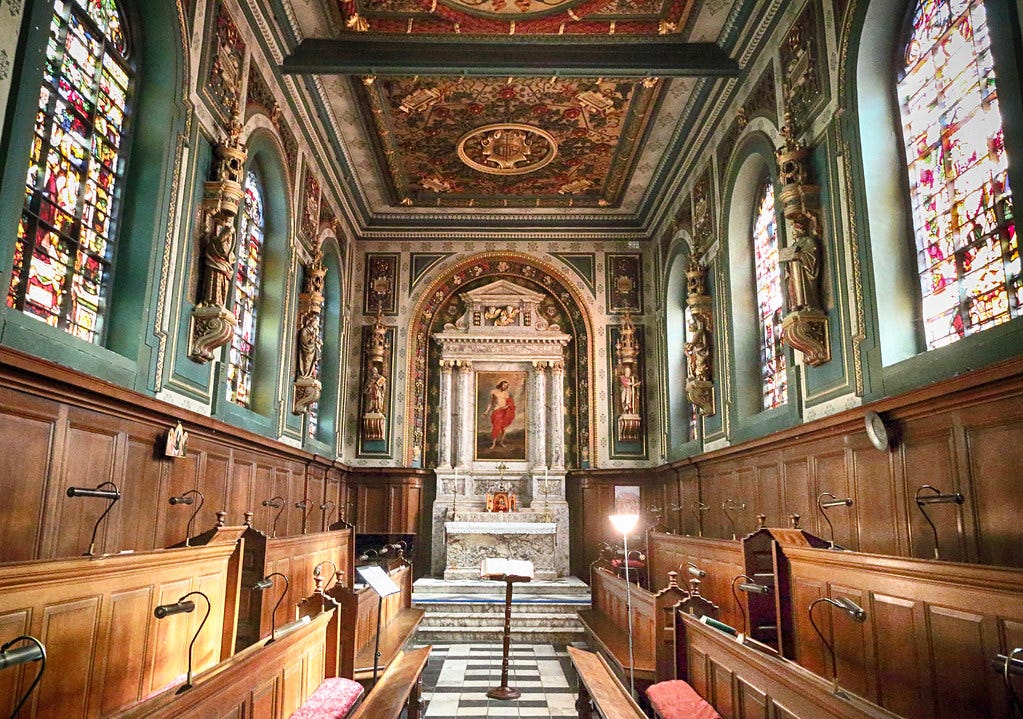This post was going to be about a poem called Travelling Through the Dark by William Stafford. I first read it over twenty-five years ago in a poetry class I took at BYU. One of the reasons I liked it was because Stafford was from western Oregon (where I’m also from) and wrote about people and places I could relate to. It also resonated with me because the tone of the writing captured a small moment that felt much larger and more universal. Somehow Stafford was able to draw me into the moment, kneeling at the edge of a rain-slick road in the dark, facing an impossible decision.
But reading it again revived a deep sadness I’d forgotten the poem contained and a reminder of the brutality we must observe and sometimes endure in this fallen world. To get anything out of what I’m about to share, you should probably read the poem. But don’t say I didn’t warn you.
(Because I’m all about added value, here’s some melancholy rainy-day music to add some mood to your reading. #Much❤️ to my subscribers!)
One of my favorite lines from Stafford’s poem is just before he decides what to do with the deer’s lifeless body as the wilderness listens:
“I thought hard for us all—my only swerving—,”
I so get that moment. Don’t you too? No matter what I choose, there will be a cost. No matter how hard I push back against the darkness, there will always be more.
Have you ever been out running errands or been stopped at an intersection somewhere and seen an individual or family standing there on the corner, sign in hand, asking for donations? We probably all have. I rarely carry cash and sometimes use that as an easy out to avoid eye contact with them, with the flimsy thought that “If I had some cash on me, of course I would help them.” But just as often, I pull away and think to myself, “How did they end up on that corner? What’s their story? And how will it end? Why them and not me? Why? Why? Why?” And then the silence…
Paul’s famous teachings about charity include the unusual and oft-quoted phrase “through a glass, darkly” (1 Cor. 13:12.) Here’s the complete passage: “For now we see through a glass, darkly; but then face to face: now I know in part; but then shall I know even as also I am known.”
I feel like I am looking through the glass darkly about so many different things lately. Here’s just a partial list.
Am I doing what I’m supposed to be doing? I think I was sent here to do something. But am I actually doing it? Have I ever done it, or even come close? And how will I know for sure if I am doing whatever “it” is?
Why are so many good people suffering? The broken seem to be everywhere. Victims of war, abuse, poverty. Infinite numbers of them.
Why do I have so much when so many have so little?
I sorrow for those who feel they don’t belong or who have been rejected because of race, sexuality, lack of education, legal status, and so much more. Most of the time I don’t know what to say or how to help them. Or is the problem that I don’t really want to help them?
I seem to be getting more resistant to spiritual nudges or, at the very least, I’m finding it harder to feel confident that I’m being guided. What does that mean?
To Paul’s point, “now I know in part,” I know that God loves His children, but I sure struggle with seeing beyond the finite now to the infinite future when all will be made right for everyone who has ever suffered. How to come to terms with so much that seems unfair is not a quick nor simple exercise.
All of this to say—despair is always right there—waiting to intrude, to bruise, to scratch and claw its way past our hope and drag us down.
In November 2018 (AKA the “Before Times”) Elder Jeffrey R. Holland, an Apostle for The Church of Jesus Christ of Latter-day Saints, was given a rare and significant privilege to speak at Pembroke College Chapel at The University of Oxford. His speech was the latest in a annual presentation known as “The Nine Lessons and Carols” and was titled “Christmas Comfort.” It is a brief but deeply moving message which I encourage you to read in its entirety.
Elder Holland recounts the story of a Christmas Eve many years ago when his father lay dying in a hospital after suffering two heart attacks following back surgery. He died shortly thereafter. Heartbroken over the imminent loss of a parent and questioning why such a tragedy would be allowed to happen at Christmastime, Elder Holland recalled the following moment when his perspective suddenly changed.
“At 3:00 a.m. or so, early in the morning in a very quiet hospital, immersed as I was in some sorrow and a lot of self-pity, heaven sent me a small, personal, prepackaged revelation: a tiny Christmas declaration. In the midst of my mumbling about the very poor calendaring of all this, I heard the clear, unbroken cry of a baby. It truly startled me. Only then did I realize that I, in my wandering, had gone near the maternity ward, somewhere, I suppose, near the nursery. To this day, I do not know just where that baby was or how I heard it, but I like to think it was a brand-new baby, taking perhaps that first breath and announcing that he or she had arrived in the world, a fact of which everyone was supposed to take note.”
“In that moment, it was as if the Lord had sent me a theological wake-up call: ‘Listen, Jeffrey. This is the happiest night in the whole year for some young couple who may otherwise be poor as church mice. Perhaps this is their first baby; perhaps he or she is their own personal consolation of Israel; perhaps he or she is the only consolation they have right now in what otherwise may be a difficult life. In any case, they already love this baby and this baby already loves them.’ And think of the calendaring: born on Christmas Day! What a reminder of God’s grace and timing. Whatever pain may lie ahead, whatever sword may pierce their souls from time to time in life, they will be triumphant because of another birth, because the Prince of Peace was also born that same day, ‘once in royal David’s city.’”
I’ve never been to Pembroke Chapel, let alone Oxford. Maybe someday. It is stunningly beautiful. When I read Elder Holland’s story, I try to picture myself there, listening and watching intently. Trying to breathe in the meaning of this message, given on a dark night on the cusp of the Christmas season.
Yes, there is great evil in this fallen world. Yes, there is a never-ending wave of tragedies and losses and heartbreak upon heartbreak. And yes, there will be much more before this sobering mortal moment concludes.
But there is also the Light of the World. Somehow, impossible to understand, He experienced all of it, all at once.
His call to me, to you, to those who claim fellowship with Him, seems too simple at first, too basic. “Love one another, as I have loved you.” But deeper reflection leads to the realization that this is exactly how Jesus overcame a world awash in hate. It was with love, always love.
I began this post with a brooding poem about trying to make the best of something terrible we didn’t cause. I end with another poem, this one in song form, by Scottish singer/songwriter KT Tunstall. It’s called Through The Dark. Seemed fitting somehow. I’d suggest you follow along with the lyrics below as you listen.
Through The Dark
As I walk away
I look over my shoulder
To see what I'm leaving behind
Pieces of puzzles
And
Wishes on eyelashes fail
Oh!
How do I show all the love
Inside my heart
Well this is all new
And I'm feeling my way through the dark
And I used to talk
With honest conviction
Of how I predicted my world
I'm gonna leave it to star gazers
Tell me what your telescope says
Oh what is in store for me now?
It's coming apart
I know that it's true
Cause I'm feeling my way through the dark
Try to find a light on somewhere
Try to find a light on somewhere
I'm finding I'm falling in love with the dark over here
Oh oh what do I know I don't care
Where I start
For my troubles are few
As I'm feeling my way through the dark
Through the dark
I'm feeling my way through the darkThe only way that makes any sense to me is to try and overcome darkness with light—with Light. I’m not good at this. I should be so much further along. Just don’t give up, right? No matter what.
“Traveling through the dark.”
“Through a glass, darkly.”
“I’m feeling my way through the dark.”
Indeed.
“Dear Martha…”
Next week, a love letter to Martha. Yes, that Martha. The one who also chose the good part. She deserves a deeper look. And that is exactly what we do here on The Bright & Morning Star, yes? I hope you’ll join me. And also, I would L.O.V.E. it if you feel to share what I’m sharing with you. Thanks so much!









If you are seeking, seek us with joy
For we live in the kingdom of joy.
Do not give your heart to anything else
But to the love of those who are clear joy,
Do not stray into the neighborhood of despair.
For there are hopes: they are real, they exist –
Do not go in the direction of darkness –
I tell you: suns exist.
--Rumi
"You do not yet look so happy as I mean you to be."
Lucy said, "We're so afraid of being sent away, Aslan. And you have sent us back into our own world so often."
"No fear of that," said Aslan. "Have you not guessed?... all of you are -- as you used to call it in the Shadowlands -- dead. The term is over: the holidays have begun. The dream is ended: this is the morning."
And as He spoke He no longer looked to them like a lion; but the things that began to happen after that were so great and beautiful that I cannot write them. And for us this is the end of all the stories, and we can most truly say that they all lived happily ever after. But for them it was only the beginning of the real story. All their life in this world and all their adventures in Narnia had only been the cover and the title page: now at last they were beginning Chapter One of the Great Story which no one on earth has read: which goes on forever: in which every chapter is better than the one before.
--CS Lewis, _The Last Battle_
I woke up way too early feeling the weight of “the dark” in the world. I reached for my phone in hopes of finding something to read that might comfort my soul. I swiped to unlock the screen and found multiple scripture references for the word “joy” just sitting there, waiting for me in the dark.
The gentle reminder was exactly what my heart needed in that moment “…weeping may endure for a night, but joy cometh in the morning.” (Psalm 30:5)
Then, your post. Your words helped me to understand that what Elder Gong refers to as covenant belonging, is all about “feeling our way through the dark” together, until morning comes. Thank you.